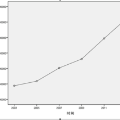Statistical optimality benchmarking is crucial for analyzing and designing time series classification (TSC) algorithms. This study proposes to benchmark the optimality of TSC algorithms in distinguishing diffusion processes by the likelihood ratio test (LRT). The LRT is an optimal classifier by the Neyman-Pearson lemma. The LRT benchmarks are computationally efficient because the LRT does not need training, and the diffusion processes can be efficiently simulated and are flexible to reflect the specific features of real-world applications. We demonstrate the benchmarking with three widely-used TSC algorithms: random forest, ResNet, and ROCKET. These algorithms can achieve the LRT optimality for univariate time series and multivariate Gaussian processes. However, these model-agnostic algorithms are suboptimal in classifying high-dimensional nonlinear multivariate time series. Additionally, the LRT benchmark provides tools to analyze the dependence of classification accuracy on the time length, dimension, temporal sampling frequency, and randomness of the time series.
翻译:统计优化基准测试对于分析和设计时间序列分类(TSC)算法至关重要。本研究提出了一种通过似然比检验(LRT)基准评估TSC算法在区分扩散过程中的最优性。根据Neyman-Pearson引理,LRT是一种最优分类器。LRT基准测试计算效率高,因为LRT不需要培训,而且扩散过程可以有效模拟,并且灵活地反映现实世界应用的具体特征。我们使用三种广泛应用的TSC算法:随机森林,ResNet和ROCKET进行演示基准测试研究。对于单变量时间序列和多元高斯过程,这些算法可以实现LRT最优性。然而,这些模型不偏不倚地在分类高维非线性多元时间序列时是亚最优的。此外,LRT基准提供了分析分类准确性与时间长度,维度,时间采样频率和时间序列的随机性之间的依赖关系的工具。


